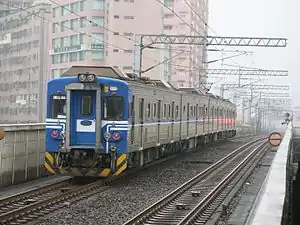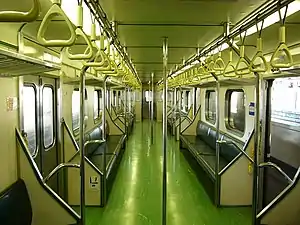EMU500 series
The EMU500 series is a series of electric multiple unit passenger trains operated by Taiwan Railways Administration (TRA). The trains are built as local trains and are used throughout the country's rail network.
| EMU500 series | |
|---|---|
 An EMU500 at Xike in April 2016 | |
 Interior of an EMU500 train | |
| In service | 1995–present |
| Manufacturer | Daewoo, Siemens |
| Constructed | 1995–1997 |
| Number built | 344 |
| Number in service | 340 (as of 2015)[1] |
| Formation | EMC-EP-ET-EM |
| Specifications | |
| Train length | 20,330 mm (66 ft 8 in) |
| Width | 2,853 mm (9 ft 4.3 in) |
| Height | 4,219 mm (13 ft 10.1 in) |
| Entry | Low floor |
| Doors | 3 per side per car |
| Weight |
|
| Power output | 2,000 kW (2,700 hp) |
| Tractive effort | 210 kN |
History
In the 1990s, the TRA was facing an aging fleet of local trains, all of which did not feature air conditioning. Therefore, in 1993, the company entered a contract with South Korean manufacturer Daewoo to build 344 cars, which would be arranged into 86 trainsets. The first of these trains arrived in the summer of 1995, and the first passenger service began in 11 October of the same year.[2]
Features
The train is built on a system developed by Siemens, which features three-phase induction motors and a 16-bit control system. Trains are usually operated in four-car units in the following order: a motorized car with the cab (EMC), an unmotorized car with a pantograph (EP), an unmotorized car (ET), and a motorized car (EM). The braking system is supplied by Knorr-Bremse.[2]
The exterior of the train is made of stainless steel, the first in Taiwan to use the material. Its appearance is based on the design of the DR3000 series. Each car features three doors on each side, an improvement from the EMU400 series' two doors. The destination signs have black text over a white background, which is inverted from the EMU400 series; this was updated to an LED display in 2004–2005.[2]
Similar to other local trains, seats run parallel to the walls of the train. The cars originally had one step at each door; this was removed beginning in 2017 by raising platforms and remodeling the interior to turn the trains into a low floor layout for accessibility.[3] With this change, the doorframe was raised slightly, and an LED display was installed above the doors.[2] As of August 2019, 246 out of 334 cars are low floor.[4]
Incidents
On 15 June 2007, a southbound EMU500 series train number 2719 was changing tracks south of Dali station when it was hit by a northbound E400 series that was undergoing testing. The E400 hit the second car of the four-car unit, killing 5 and injuring 17. The TRA determined that the crash was caused by a faulty ATP system in the E400, as well as speeding by the train driver causing him to misread the signs.[5]
On 8 July 2016, a bomb was detonated within a northbound EMU550 train number 1258 near Songshan station, injuring 25 people.[6] The perpetrator, who was also injured, was arrested and sentenced to 30 years in prison.[7]
On 27 April 2020, A EMU500 series train collied with another EMU500 series train near Hualien station, injuring 7 TRA employees.[8]
References
- "臺鐵整體購置及汰換車輛計畫(104~113年)" (in Chinese). Taiwan Railways Administration. 2015. p. 12. Retrieved 30 April 2020.
- 閃耀的加速王~EMU500 (in Chinese). Train Collection. Retrieved 3 May 2020.
- 王苡嫣 (3 February 2017). "上下車更方便 台鐵車廂月台無階化預計109年完工" (in Chinese). Now News. Retrieved 3 May 2020.
- 曹悅華 (3 September 2019). "太魯閣號無階化9月終於要動工 變更契約後多花1億" (in Chinese). United Daily News. Retrieved 3 May 2020.
- 胡健森; 游明金; 曾鴻儒; 蘇永耀 (16 June 2007). "火車相撞 5死17傷" (in Chinese). Liberty Times. Retrieved 3 May 2020.
- "台鐵松山車站列車爆炸 2重傷23輕傷[更新]" (in Chinese). Central News Agency. 8 July 2016. Retrieved 3 May 2020.
- "台鐵爆炸案 林英昌判刑30年4月定讞" (in Chinese). Central News Agency. 8 November 2017. Retrieved 3 May 2020.
- 許家寧; 潘千詩 (27 April 2020). "台鐵又出包 維修列車對撞 傳花蓮機務段7員工受傷" (in Chinese). China Times. Retrieved 3 May 2020.
| Wikimedia Commons has media related to TRA EMU500. |
